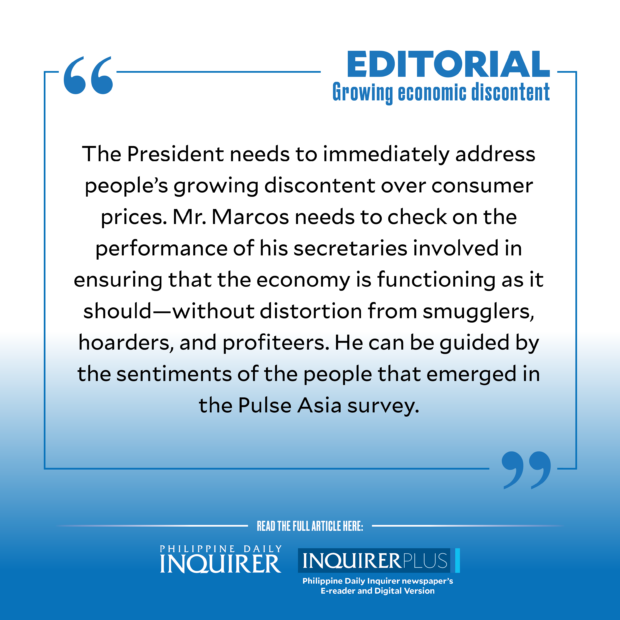Growing economic discontent

Senate President Juan Miguel Zubiri’s advice to President Marcos to revamp his official family and replace underperforming Cabinet secretaries is not without basis. According to Pulse Asia’s latest “Ulat ng Bayan” survey, conducted from Sept. 10 to Sept. 14, both Mr. Marcos and Vice President Sara Duterte suffered double-digit declines in approval and trust ratings. It was the first time the scores of the country’s top two leaders fell by two digits since the new administration started in June last year. The ratings for the heads of Congress and even the judiciary declined as well.
According to Pulse Asia president Ronald Holmes, “continuing increase in prices of basic commodities and services and unfulfilled promise of reducing these” likely caused the “significant” drop in the approval ratings. Mr. Marcos, also the concurrent agriculture secretary, has failed to keep inflation in check, with the rate of price increases still higher than the government’s 2-4 percent target despite interventions such as food import tariff cuts. Last month, the President imposed price ceilings for rice to help address the rising cost of the staple food, but this did not help bring down prices. The Philippine Statistics Authority (PSA) last week reported that inflation rose to 6.1 percent in September, due mainly to higher food prices. It was the 18th straight month that inflation stayed above the government target. The President said his lower approval ratings did not come as a surprise to him, noting that people are suffering amid high rice prices. This fact is supported by the results of Pulse Asia’s national survey done last Sept. 10-14 on “Urgent National Concerns,” which showed that 74 percent of respondents worry about inflation.
What is obvious is that the growing discontent among Filipinos is being caused by the high prices of many essential goods and services, not only of rice. For instance, expensive oil imports have the cascading effect on a lot of economic activities as well, including increased transport cost for both industries and commuters, higher electricity rates, and eventually rising retail prices. But what exacerbates the situation, especially for rice, is that prices are artificially inflated by smugglers and hoarders. As the President noted, the country has no problem regarding rice supply, pointing out that the current buffer stock was for more than 30 days and rising. “We really do not have a shortage of rice. But because of these smugglers, hoarders and price manipulators, the supply is constricted and so the prices increase,” the President pointed out.
Article continues after this advertisementThe answer therefore is an honest-to-goodness drive against smugglers, hoarders, and profiteers. Last week, the President said his administration would not just sit idly by and vowed to put an end to all illegal activities in the rice market, pointing out that the government has already filed smuggling charges against rice importers, among them San Pedro Warehouse and Blue Sakura Agri Grain Corp., FS Ostia Rice Mill, and Gold Rush Rice Mill. Curiously, no mention was made as to whether charges were also filed against erring government officials who may have facilitated those illegal activities. It seems unimaginable for smugglers, hoarders, and cartels to operate without any help from people who are supposed to stop them.
This brings the issue back to what Zubiri suggested, for the President to look at agencies that are supposed to track why there is distortion in the market. “Why is there overpricing? Why is there hoarding? Why have they yet to capture hoarders? Why haven’t they scolded price manipulators?” he asked.
At the same time, the President must now appoint a permanent agriculture secretary to oversee the sector and institute the necessary reforms and programs to boost food production and overall productivity of farmers and fishermen. As head of state, Mr. Marcos has a myriad of things to attend to and therefore finds limited time to focus on the agriculture sector. There is another measure that the President can consider. Given that smuggling and other illicit activities that distort the market cannot prosper without the participation of unscrupulous officials in the government, Mr. Marcos can once and for all address this issue by appointing an anti-corruption czar, or even creating a separate office for this using the intelligence funds of agencies that do not need them.
Article continues after this advertisementTime is of the essence. The President needs to address immediately the growing discontent among the people about consumer prices. Mr. Marcos needs to check on the performance of his secretaries involved in ensuring that the economy is functioning as it should—without distortion from smugglers, hoarders, and profiteers. He can be guided by the sentiments of the people that emerged in the Pulse Asia survey. After inflation control, adult Filipinos said they were also concerned about increasing workers’ pay, additional job creation, reducing poverty, and fighting graft and corruption in government. These are the areas that the President must focus on.
















